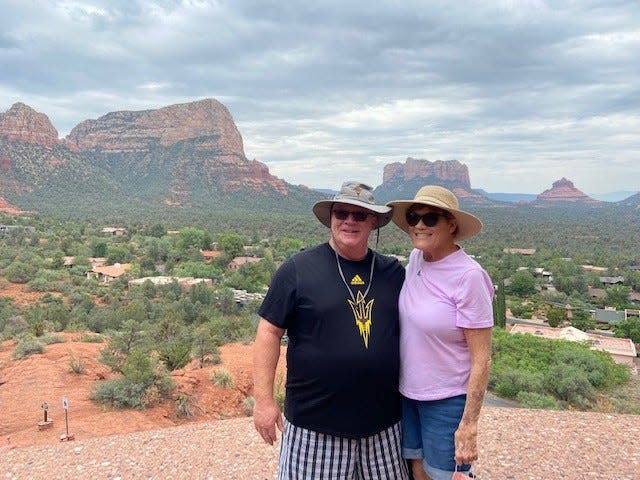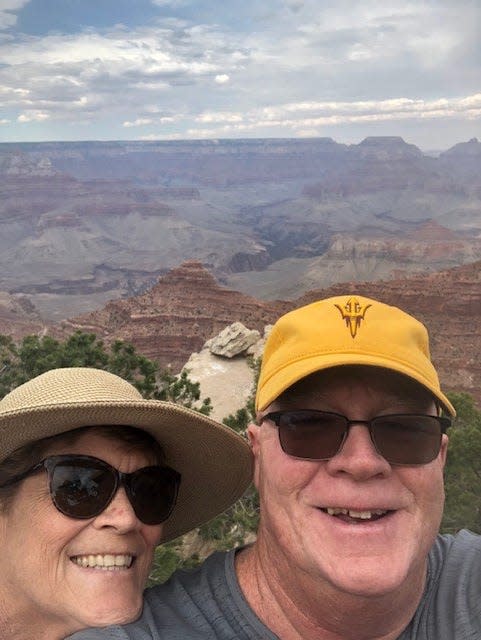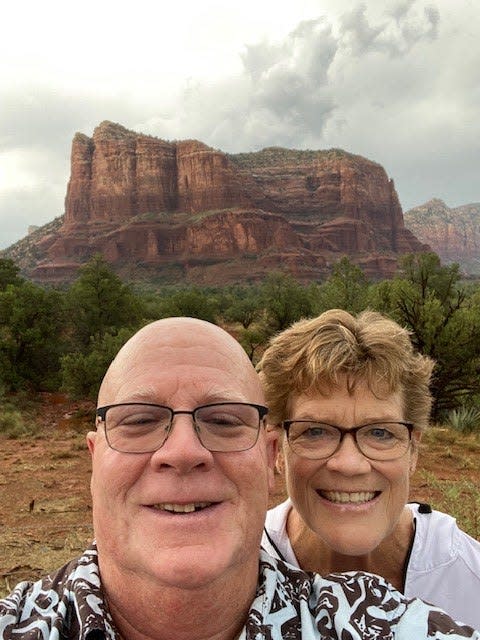ASU assistant football coach Mike Cavanaugh helps wife Laurie through kidney transplants

Mike Cavanaugh was at a coaching convention in San Antonio, Texas, and having lunch with his wife, Laurie, along the popular Riverwalk when the couple received the news they had been waiting nearly two years to get.
The news came from Danny Langsdorf, then a fellow coach on staff at Oregon State. Before the group had departed for the convention, Langsdorf had undergone a battery of tests in the hope he would be a match for Laurie, who dealt with kidney disease most of her life and was in need of a donor for a transplant.
"I was walking around down there when I got the call that I was a match," said Langsdorf, now on staff at Temple. "Next thing I know I run into Mike and Laurie and I told them, 'You're never going to believe it. I just found out I'm a match.'"
In the two-year wait, more than a dozen donors had been tested, with Langsdorf eventually deemed an even better match than several family members. It can take anywhere from three to five years for some on a waiting list to find a living donor, so it was a relief when Laurie finally had the transplant surgery at Portland's Oregon Health & Science University Hospital in 2007.
Since then, Laurie has had a second kidney transplant, that one coming in May of 2021, several months after Mike had been named offensive line coach at Arizona State by head coach Herm Edwards.
Laurie, a retired nurse, has been diagnosed with autosomal dominant polycystic kidney disease, a genetic disorder characterized by the growth of cysts in the kidneys. It is a progressive disease with symptoms worsening over time.
Her father died from kidney disease when he was 45. Two of her siblings have also had kidney transplants. The health challenge is something the couple has faced throughout their 37-year marriage.
Cavanaugh is an old-school coach who can appear a bit gruff. On the football field it isn't uncommon for him to hurl a choice few words at a player not adhering to technique pointers the coach had been emphasizing.
Off the field that is hardly the case.

Tight ends coach Juston Wood says his two young kids call the two "Auntie Laurie and Uncle Cav."
Ask Mike about his wife and the courage she has shown and that tough façade crumbles quickly.
"People think football coaches are tough. I'll tell you what, she's tough," said Mike, choking back tears. "She stayed so positive throughout everything. I don't know if I could have stayed that upbeat if it was me. She amazes me every single day."
Coaches learn to adapt. They are hired and fired and are seemingly always on the move. Not only has Mike coached at ASU, Syracuse and Oregon State, but there have been stops at Nebraska and Hawaii as well, not to mention ones at lesser-known programs like Ferris State, Sacred Heart, Murray State, Alma College and Wesleyan College (Conn.).
It isn't surprising the couple has been able to handle any obstacle thrown at them.
The best example of that came when Laurie was searching for a kidney donor for the second time and the couple was living on the east coast with Mike on staff at Syracuse. Laurie was on the waiting lists at both Upstate University Hospital and Yale-New Haven Hospital.
It was January of 2021 when the couple got a call from Upstate Hospital that a donor was identified and they needed to make their way to the hospital — immediately.
The COVID-19 pandemic and the restrictions in place at the time meant patients could not be accompanied by anyone else. Mike had to drop her off at the hospital entrance and go elsewhere to wait for word. Laurie was undergoing tests and other preparatory work while waiting for the kidney to arrive. But 10 or so hours later the surgery was called off when the kidney was not deemed viable.
It was a rollercoaster of emotions for the couple, as well as their sons, Blair and Shane, now 28 and 35, respectively.
"It was every emotion you can imagine in the same day," Laurie said. "Then to get your hopes up this was going to happen, only to be disappointed. And then not know when the next opportunity would come. It was crushing."
However, it didn't take long for them to get some much-needed good news. Edwards called and offered Mike the position as offensive line coach, succeeding the retired Dave Christensen. A cross-country move is difficult in the best of circumstances. But a health concern amplifies that challenge.
The couple did their homework and found Mayo Clinic could provide the care Laurie needed. The move was on.
"We talked about it and we thought it was a good opportunity for us," Mike said. "We were a little bit concerned because of what she was dealing with but once we started talking to people and we found out how good (Mayo) really was, we weren't as nervous."
A couple of weeks later, Mike left for Arizona. Laurie remained behind for a few months to work on selling the couple's other house and tie up other loose ends.
"It was a whirlwind, so much happening at once," Mike said. "You do your homework. You keep the faith that you're making all the right decisions and things are going to be alright and you're being led in the right direction and that really has been the case."

The coaching fraternity is tightly knit. Each time Laurie needed a kidney, peers went to work in the most selfless ways possible. Fellow coaches and their wives were tested Former players even got tested. The second kidney transplant was made possible because Poppy McLeod, wife of the team's strength and conditioning coach Clete McLeod, donated a kidney as part of an exchange program. She wasn't a match for Laurie, but that kidney was put in a pool from which Laurie found a donor.
The Cavanaughs say they will be forever grateful, not just to Langsdorf but to all the other coaches, friends and family members who were tested and are now advocates for organ transplants. Laurie was down to 15% kidney function the first time she had the transplant and 17% the second time. The swelling in her legs and feet made it difficult to walk. Had donors not been found she would have faced dialysis treatment.
Langsdorf encourages others to think about organ donation and said he was glad to be able to help.
"The whole process really got me thinking more about my own health. I had tests done that I would never have had if I weren't going through the process," he said. "Yes, I was a little uncomfortable for a few days but nothing that should discourage anyone from going through it if they can help another person."
Laurie is doing well now and the couple hopes advances in the medical field will mean she won't have to have a third kidney transplant. The tables have also turned in the Cavanaugh's Ahwatukee household. Mike had knee replacement surgery five weeks ago, so he's now the patient. And, yes, that gruff demeanor can resurface. Football coaches aren't always the most patient patients.
"I told him I was a much better patient than you are," Laurie said.
Reach the reporter at Michelle.Gardner@gannett.com or 602 444-4783. Follow her on Twitter @MGardnerSports.
Subscribe to azcentral.com today.
This article originally appeared on Arizona Republic: Coaching community helps ASU OL coach, wife through 2 transplants

 money
money 